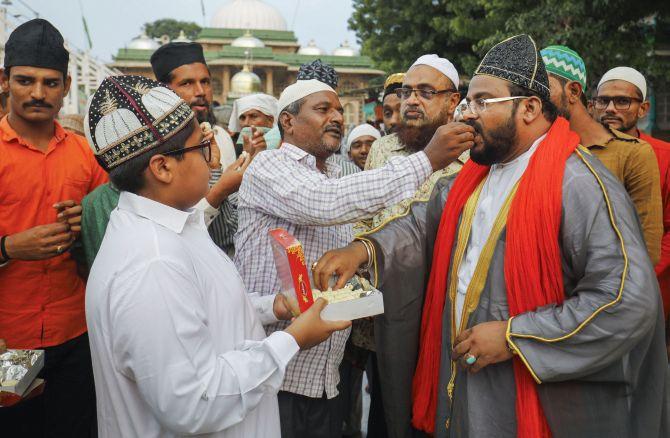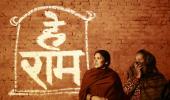'The political fallout of the verdict on national politics is pregnant with incredible opportunities.'
'Post-judgment politics can change the ground rules of election campaigning in the coming decades,' says Sheela Bhatt.

Prime Minister Narendra Damodardas Modi's 11-minute speech will turn out to be as historic as the five judge bench's unanimous verdict on the Ram Janambhoomi-Babri Masjid dispute if it opens a small window of engagement for Modi's Bharatiya Janata Party with India's Muslim voters.
The historic judgment was waiting to happen for a decade or so. Supreme Court Chief Justice Ranjan Gogoi and his four brother judges have shown the temerity to deliver a legal verdict within the framework of the Constitution on issues that concern the respective faiths of the two communities.
The judgment carries within its strengths and weaknesses and some strange contradictions, but its credibility stems from the fact that it was an unanimous verdict.
If you look beyond the obvious displeasure over the judgment within the fraternity of Left-leaning intellectuals, secular liberals and politicians who depend on communal votes, there is a vast majority of Muslims who have time and again wanted to get rid of the Ram temple-Babri mosque dispute. They were in a lose-lose situation since Lal Kishenchand Advani embarked on his rath to demand a Ram temple in Ayodhya in the fall of 1990.
Of course, all secular Indians of different faiths justifiably want justice for the criminal act of the Babri Masjid demolition, but Muslims confronted a double whammy as the issue was the biggest divider in society due to the communal political platform that it provided on both sides of the political spectrum.
There is no doubt that the starkly communal issue was advantageous to the BJP as it divided voters and helped it rule.
While indulging in politics over the Ram temple, Muslim leaders were deeply divided and the legal brains helping them could never get the upper hand. As a result, their supporters remained powerless.
Tanvir Ali lives in Shamli, western Uttar Pradesh. I called him a few hours after the judgment, around 5 pm. His village is surrounded by the most sensitive communal areas of Saharanpur and Muzaffarnagar.
"How do you see the judgment?" I asked him. "Is it fair?"
The young Muslim, who owns a small business, declared, "AB RAM MANDIR POLITICS KHATAM HO GAYI! Yahan to bilkul shanti hai aaj (The Ram temple politics has ended! It is peaceful here). All my friends and relatives have accepted the verdict."
How profound is this view of an ordinary Indian!
It is the end of Ram temple politics, Tanvir thinks.
The unnecessary attention that the Ram temple-Babri mosque issue received every election and in national discourse will end. Modi's Saturday speech should be seen from Tanvir's angle.
More importantly, Modi's BJP should view the judgment from Tanvir's perspective.
Since 2014 those who have observed Modi's politics wondered how, in his personality-oriented politics, Modi would crack this Hindu-Muslim code entangled with the Ayodhya movement.
His Saturday speech is the beginning of a new political game with new conditions and fresh terms for a 'new India'.
The BJP has always been envious that in each and every electoral constituency in India, before an election, the assessment of the BJP's strength vis-a-vis the Congress begins by counting Muslim votes en bloc going to the Congress candidate when pitted directly against a BJP nominee.
This scenario where the BJP's poll pundits routinely put Muslims and staunch secular voters in hundreds of constituencies on the debit side may see some change if Modi and Home Minister Amit Anilchandra Shah plays their cards well.
Saturday's tight law and order vigil in north India reveals that much homework had been done by the home minister before the judgment was delivered. The Modi government has done well to control the Hindutva brigade and keep their views at a low volume.
Anti-BJP forces and critics of the current judicial set-up will find it difficult to reject the Ayodhya verdict in toto because it has been layered in such a way.
Even the CPI-M's press statement is quite mild where the party says it expects that the criminal trial against those accused of the Babri Masjid demolition should be expedited. An important issue the CPI-M has raised is about the 1991 Places of Religious Worship Act. The party wants adherence to this law to 'ensure that no such disputes on religious places are again raised and utilised.'
The Supreme Court has invoked the Constitution's Article 142 to allot 5 acres in a prominent location in Ayodhya to the Sunni Waqf Board. Article 142 could be used to give a sense of 'complete justice'.
Sunni Waqf Board lawyer Zafaryab Jilani pointed out that he does not think that the scope of Article 142 allows the court to take one's vested right and give it to others.
If Muslims are ready to accept the verdict it is because in such a huge country all of us know the buck has to stop somewhere and it stopped at the five-judge Supreme Court bench in this case.
"There was no surprise," a senior Congressmen told me. "Most Muslims were expecting such a verdict." The Congress has quickly grasped the moment and accepted the judgment. Many community leaders hope that after the Ayodhya verdict, the BJP will give a better share of power to minorities at all levels of society.
The political fallout of the verdict on national politics is pregnant with incredible opportunities. Post-judgment politics can change the ground rules of election campaigning in the coming decades.
This historic judgment has the potency to break the status quo in the Indian polity.
Modi has rolled the dice to check the mood of both sides. On one hand, his party will lose its most favoured election plank and on other hand it will allow him to expand his party's limited vote share beyond conventional BJP voters.
Understandably, many Muslims and secular Hindus are dissatisfied with the judgment and dismayed that the entire disputed plot in Ayodhya has gone to Hindus, but in reality the judges have woven complex threads for unity.
The plot of land, the core issue before the court, has not gone to a Hindu or to a Muslim.
Deity Ram owns this land. Its philosophical interpretation could be that the land under dispute does not belong to Hindus or Muslims, but belongs to Ram Lalla. Neither Hindus nor Muslims got control of land. It is the nation consisting of all faiths who will now build the Ram temple.
All is not lost for secular hearts because the BJP has lost its potent election campaign plank while welcoming the judgment that allows the building of the Ram temple not by Hindus, but by the government.
Who doesn't remember that in 1993 the BJP lost considerably in elections held soon after the Babri Masjid demolition?
Recently it lost its majority in Haryana and suffered a setback in Maharashtra soon after it took the bold and historic decision to abrogate Article 370.
Hopefully, this judgment will help the Indian polity to move towards the one and only political plank to win or lose elections: Sustainable economic development.











 © 2025
© 2025